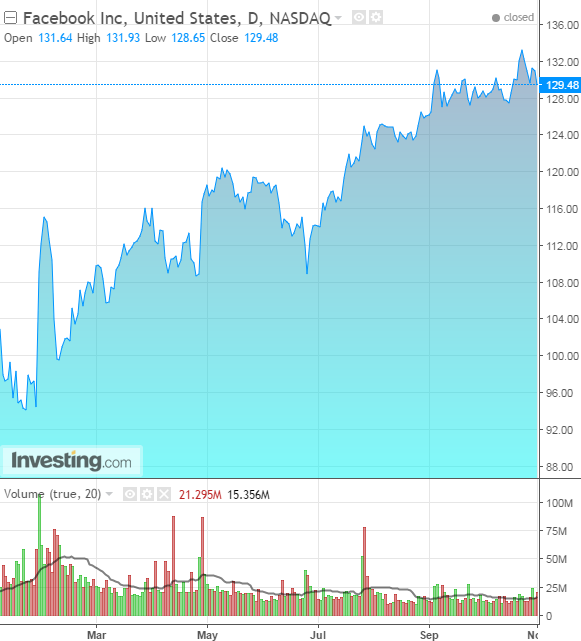by Clement Thibault
Facebook (NASDAQ:FB), the global social media company which operates mobile applications and a website, reports Q3 2016 earnings on Wednesday, November 2, after the market closes.

1. Earnings and revenue
Facebook is expected to continue the stellar year it's had so far, and report earnings of $0.96 per share on $6.92 billion in revenue. This would extend the company's streak of successes along with growth. Specifically, it would represent EPS growth of 70% alongside 54% revenue growth—indeed, in every one of the past three quarters, FB revenue grew by more than 50% YoY, while EPS more than doubled.
2. User Growth
The story for social media companies always starts (and sometimes ends) with user growth. With 1.12 billion daily users worldwide, Facebook has been doing remarkably well during the past few years, posting consistent, double digit user growth. Last quarter saw a 17% bump up in users, an astonishing number for a company that already had almost a billion daily users.
Facebook's recent growth in the US is understandably slower, up 6.7%, compared to a 21% spurt in the Asia-Pacific region. Mobile daily active numbers, which grew from 844 million to 1.03 billion, a 22.3% percent upsurge, clearly indicates that the mobile growth has been offsetting the loss of PC users, a trend that's likely to continue worldwide.
3. Monetization
Facebook makes money by displaying targeted advertising to users, and its revenue per user continues to grow. As we reported last quarter, compared to last year, Facebook is displaying about 50% more advertising to each user compared to last year. This is a massive increase. Clearly, Facebook is banking on people being 'hooked' enough on the service so they won't desert the site because of additional ads.
This could represent a significant win for FB; the amount of money spent on digital advertising as a whole goes up every year, with internet advertising expected to grab $260 billion in 2020. In particular, mobile advertising revenue is grabbing a bigger chunk of online advertising every year, a fact that segues nicely with Facebook's current position as a mobile powerhouse.
After successfully ramping up the number of ads a user sees, it wouldn't surprise to see the advertising industry allocate additional money toward FB advertising, followed by Facebook raising rates. Since selling ad space is Facebook's core business and it is one of the two leaders in this industry (Alphabet (NASDAQ:GOOGL) is the co-leader), internet advertising will continue to drive FB's top line results.
3. Competition from Snapchat
Snapchat, the privately held, image messaging and multimedia application, has been causing some serious headaches for Facebook almost since Snapchat's 2011 release. Facebook tried to acquire the company in 2013 for $3 billion dollars, only to be rebuffed by Snapchat's CEO, Evan Spiegel.
Every analyst report lists Snapchat as one of the top three most popular social networks for US millennials, while a survey revealed that 35% of US teens see Snapchat as their most important social network, compared to just 13% who have that view of Facebook. Given that US users are—by a wide margin—the most valuable users for Facebook (with average revenue of over $14 per user compared to a world average of under $4), no surprise that Facebook is somewhat threatened by its smaller competitor. Facebook is therefore taking steps to counter Snapchat's rise, such as by unsuccessfully trying to acquire Snow, an Asian Snapchat clone this summer.
Facebook also launched a social video app for teens on August 23, called 'Lifestage' and added Snapchat-like filters to its camera, in an attempt to provide a similar experience in-house, rather than have users flock to a competitor.
Conclusion
Facebook shares currently sell for about $130, with a TTM P/E ratio of 62. Not surprising since Wall Street values growth over anything else. And Facebook has a proven track record on that score along with potentially achievable additional future growth.
With a market cap of $355 billion, Facebook is now also the fifth largest company in the world by valuation. Like all highly-hyped, forward-looking technology stocks (we're looking at you Amazon and Netflix), the price tag for access to the action is steep. As we said about Amazon earlier this season, the growth potential is there, and could pay out handsomely. But this stock isn't necessarily a typical conservative investment.
Until now Facebook has managed to walk the walk at the same time that it's surpassed the expectations its price tag signals. The company may be able to achieve Wall Street's targets in the near future, but with younger users constantly searching for the next, new 'hot' thing—which isn't Facebook anymore—continued significant growth is less obvious than the company's valuation would suggest.
